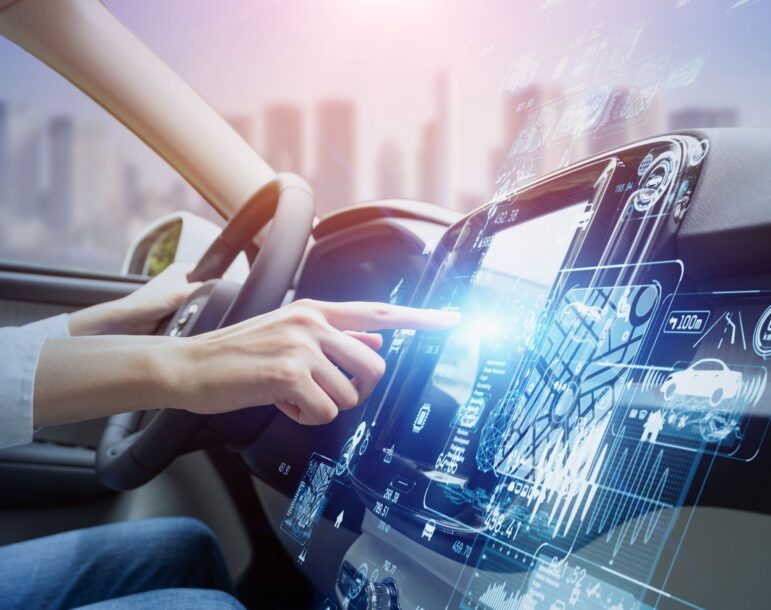As the world becomes increasingly connected and reliant on technology, the automotive industry is undergoing a rapid transformation. While this connectivity enhances convenience and functionality, it also exposes vehicles to new risks – the realm of vehicle hacking, data breaches, and cybersecurity threats. This article delves into the emerging legal landscape surrounding these challenges, exploring the risk of accidents and the intricate interplay between technology, safety, and the law.
The Rise of Vehicle Automation Systems
Beyond the futuristic appeal of self-driving cars, dozens of automakers have released automated components in recent years, including features that allow you to take your hands off the wheel under certain conditions and that help you parallel park.
An advanced driver assistance system can steer, brake, and accelerate vehicles on its own, although drivers must remain alert and ready to take control of the vehicle at any time.
Modern vehicles are no longer merely mechanical marvels; they are complex computer networks on wheels. This shift has given rise to a new breed of threats – cyberattacks that target vehicles’ electronic systems and data. From remotely disabling brakes to manipulating navigation systems, hackers can exploit vulnerabilities to compromise both driver safety and data privacy, but the question remains, who is at fault if/when these attacks occur?
Understanding Vehicle Hacking
Vehicle hacking is when someone gains unauthorized access to a vehicle’s electronic systems, often through internet-connected components. Modern cars have many electronic control units that manage different functions, like engine performance and infotainment systems. These ECUs connect through a network called the Controller Area Network (CAN) bus. While this connection allows for advanced features, it also will enable cybercriminals to find and exploit weaknesses.
Hackers can break into a vehicle’s network in various ways. They might exploit software weaknesses, target the keyless entry system, or use malware. Once they gain access, they can control important systems. Such as the engine, brakes, steering, and even airbags. This control can lead to serious problems, like intentional accidents, disabled safety features, or widespread disruption on the road.
Real-World Examples of Vehicle Hacking
Vehicle hacking might seem like a distant threat. However, real car accidents caused by vehicle hacking show just how dangerous it can be.
The Jeep Cherokee Incident (2015): In 2015, cybersecurity researchers Charlie Miller and Chris Valasek remotely hacked a Jeep Cherokee while it was being driven on a highway. They were able to take control of the vehicle’s steering, brakes, and transmission from a distance. This experiment led to a recall of 1.4 million vehicles by Fiat Chrysler to fix the security issue.
The Tesla Model S Hack (2016): In 2016, Chinese researchers from the Keen Security Lab hacked a Tesla Model S. They could control the car’s braking system, open the doors, and manipulate other crucial functions. They achieved this from up to 12 miles away. Tesla also responded by quickly releasing a software update to fix the vulnerabilities.
Uconnect Vulnerability (2015): The Uconnect infotainment system, found in millions of vehicles, had a flaw. This flaw allowed hackers to access the vehicle’s CAN bus through its cellular connection. This could give hackers remote control over critical functions like the brakes and steering. The discovery highlighted the risks that come with connected vehicle systems.
Potential Lawsuits and Legal Challenges
Product Liability Claims: Vehicle manufacturers can face product liability lawsuits if a cyberattack exposes design flaws, leading to accidents or injuries. Plaintiffs may argue that inadequate cybersecurity measures or failure to promptly address known vulnerabilities contributed to the harm.
Class Action Lawsuits: Large-scale data breaches can trigger class action lawsuits by affected vehicle owners. These lawsuits often focus on the mishandling of personal data, alleging negligence in safeguarding sensitive information.
Consumer Protection Claims: Governments and regulatory bodies might pursue legal action against manufacturers for violations of consumer protection laws if they fail to provide adequate cybersecurity measures, mislead consumers about vehicle security, or neglect to issue timely recalls.
Insurance Disputes: Vehicle owners and insurance companies could become entangled in disputes over coverage and compensation in cases where cyberattacks lead to accidents or vehicle damage.
Privacy Violations: If hackers gain access to personal data stored in a connected vehicle, consumers might bring lawsuits against manufacturers for privacy violations and breaches of data protection laws.
Supply Chain Liability: Automotive manufacturers often rely on a vast network of suppliers. If a cyberattack originates from a compromised component or system supplied by a third party, legal battles could ensue over liability and accountability.
Legal Considerations and Responses
Regulatory Compliance: Automotive manufacturers must navigate a complex web of evolving cybersecurity regulations. Compliance failures could lead to fines, penalties, and legal repercussions.
Due Diligence: Manufacturers should conduct thorough cybersecurity assessments and due diligence when integrating third-party technologies to mitigate risks and potential lawsuits.
Prompt Response: Timely disclosure and response to cybersecurity incidents are crucial. Delayed or inadequate responses may exacerbate legal consequences.
Contractual Agreements: Clear contractual agreements between manufacturers, suppliers, and technology providers can help establish responsibilities in the event of a cyberattack.
Why Do Victims of Vehicle Malfunctions Need a Lawyer?
The convergence of vehicles and technology has opened new frontiers of convenience and innovation, but it has also brought forth a host of legal challenges. Vehicle hacking, data breaches, and cybersecurity threats present an intricate landscape where traditional notions of product liability and consumer protection intersect with the digital realm.
As the automotive industry continues its technological evolution, proactive measures, robust cybersecurity protocols, and a thorough understanding of potential legal pitfalls will be essential in safeguarding both vehicle and driver from the looming specter of cyber threats that can cause a vehicle malfunction that can lead to accidents.
How can PMR Law help?
If you or someone you love has been involved in an accident due to a vehicle defect or malfunction, contact one of our Houston car accident attorneys. Contact us today to schedule your free consultation and discuss your legal rights. We care and we can help.
Contact a Local Lawyer
Get in touch with us so we can evaluate your case for free. Call PMR Law at 832-844-6428 and a member of our team will get in touch with you immediately.
PMR Law is considered one of the Best Law Firms in America, by Rue Ratings. Several of our attorneys have been given the honor of being named Super Lawyers by Thomson Reuters. The American Institute of Personal Injury Attorneys has named our attorneys 10 Best in Client Satisfaction. Speaking of personal injury, Attorney and Practice Magazine awarded our attorneys with Top 10 Personal Injury Attorney distinctions. The National Trial Lawyers have named three of our attorneys as Top 100 attorneys. The Academy of Attorneys has named two of our attorneys as Top 40 Under 40. Our attorneys have been recognized as Best Attorneys of America, by Rue Ratings. PMR Law is a proud member of the Multi-Million Dollar Advocate Forum. Houstonia Magazine has named two of our attorneys as Top Lawyers in Personal Injury.
Texas Lawyer magazine has named PMR Law as the #1 Personal Injury Law Firm in Houston.

